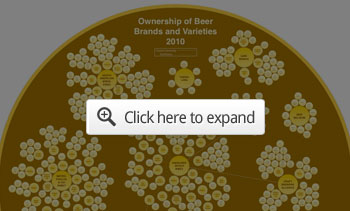Endgame: Global Monopolization
One fact that many don't realize is just how few firms control the global food system, from seeds to supermarkets. As noted by Howard:
"The trend in most industries is for fewer and fewer firms to increase their power. One really dramatic example is the beer industry. Four firms headquartered in Europe brew about half the world's beer. That's going to go down to three very soon, because Anheuser-Busch InBev is acquiring SABMiller.
Even if you're a very dominant firm, you're caught up in this system where you have to get bigger or become acquired by your big competitors. But it's resulting in less and less people making decisions about the food we eat. There's even speculation that InBev is not increasing its sales enough, even with this acquisition, so they're going to have to acquire a big soft drink firm, perhaps even Coke or Pepsi."
With its $103 billion acquisition of SABMiller, InBev became one of the three largest food firms in the world. InBev also owns Anheuser-Busch, which produces Budweiser, one of the most well-known beer brands in the world. In some parts of the world, such as in Africa and Latin America, InBev has already established a monopoly.
Antitrust rules and regulations enacted by the federal government are meant to prevent these types of monopolies. In fact, when large corporations want to buy other large corporations, a rigorous evaluation process is required before they're authorized to merge. So how is it that this kind of monopoly-building is still happening? Howard explains:
"In the early 1900s, there were a number of laws passed to prevent these trusts, these combinations that resulted in monopolies in these markets. That changed dramatically beginning in the 1980s. Reagan was elected. He directed the heads of federal agencies to take a very different view toward mergers and acquisitions.
At the same time, federal judges were being indoctrinated into the Chicago School of Economics. They got paid to go on these junkets to Arizona, Florida, places like that. They played golf. Then they attended these seminars where they were taught mergers and acquisitions that, unless they immediately raised prices for consumers, were good for everyone.
As a result of just one of those programs, by the early '90s, two-thirds of federal judges had participated. It's essentially impossible to win an antitrust case in the federal courts now."

Monopolies Do Not Benefit the Public
The truth is, monopolies really only benefit the corporations in question, not the population at large. It merely reinforces the company's power, including their political clout. Many multinational corporate executives even serve on federal advisory committees and global trade agreement working groups.
Some of these international trade deals are kept secret even from the U.S. Congress, yet executives from large multinational firms are present during the negotiations. When large companies are able to influence the very regulatory agencies that are chartered to regulate them, they're able to circumvent the regulatory process, forming what is essentially a cartel.
"A good example is the seed industry. It was taken over by big chemical companies beginning in the 1980s. We got down to just six firms. Previously, there were over 30 firms. These big six chemical companies, which are also seed companies, have cross-licensing agreements for genetically engineered (GE) technologies.
The commodity farmers that want these GE traits, like herbicide resistance — the independent seed companies cannot access those technologies. They either become acquired by these firms or end up going out of business. Right now, it's possible that those big six will be reduced to just three.
BASF … has gotten out of the seed sales. Bayer's trying to acquire Monsanto, Dow and DuPont are planning to merge … [and] ChemChina, a Chinese-owned chemical company, is acquiring Syngenta."
https://philhoward.net/2017/05/11/seed-industry-structure/
https://philhoward.net/2017/05/08/organic-industry/
More Information
To learn more, pick up a copy of Howard's book, "Concentration and Power in the Food System: Who Controls What We Eat?" If you're interested in more details, they're all there. The take-home message is that you need to vote with your pocketbook and really make the commitment to eating real, unprocessed food. Ultimately, that's how we change this corrupt and distorted food system.
As noted by Howard, it's up to each and every one of us to find out who we are supporting with our hard-earned money. In a best-case, ideal-world scenario, everyone would start cutting down on processed foods. That's really key, because if you do that, you're not likely going to support a large corporation, particularly if you buy locally.
"We need to really start avoiding those big firms, these 10 firms that control one-third of food and beverage sales in the U.S. and be willing to spend more in some cases, if it means getting a higher-quality product, or using less of it, and supporting smaller and local and independent firms," Howard says.
It's important to realize we CAN shift the behavior of these corporations. They're investor-controlled and investors want profit. If their profits go down, they have to respond to public pressure. This is how we can get many of the toxic additives out of our food supply, and how we will get GE ingredients out.
All you have to do is don't buy those kinds of products. They can have all these elaborate systems set up and control all of the federal regulatory agencies, but if people aren't buying, none of that matters. In addition to that:
"Many of these big firms receive enormous subsidies, direct and indirect. One of the ways we can change things, not only by seeking out and supporting alternatives, is by putting pressure on the government to end these big subsidies and level the playing field," Howard says.
No comments:
Post a Comment